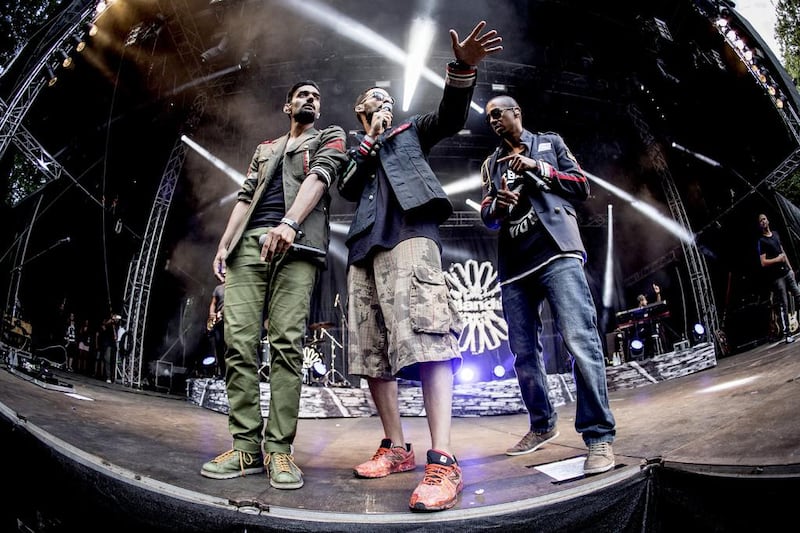It is a sunny Friday evening in Aarhus, Denmark’s second-largest city, and the annual Spot Festival is in full swing.
Over the weekend, dozens of Scandinavian rock bands and pop acts will perform – lots of blonde singers and Thor-like musicians. But at a festival venue called The Dome, a different side of Danish music is on show.
Waqas and Isam B, appearing as solo acts, are legendary figures on the Danish rap/R&B scene, and a positive force that goes beyond popular music.
Waqas has Pakistani roots, while Isam’s parents are from Morocco and, along with the Honduras-born Lenny Martinez, they comprise the revolutionary hip-hop outfit Outlandish.
The Copenhagen-based trio, who started out in the late 1990s, perform in several languages including Arabic, Urdu and Spanish, and bring a unique mix of influences to the table. They will play their first Middle East gig in Kuwait on May 22.
“I remember I always used to dig into my parents’ record collection as a child and all they had were Bollywood albums and Boney M,” Waqas says.
“So that’s my musical upbringing: Indian and funk. I’ve always liked music and my mother used to sing Muslim gospels at gatherings – if that’s a term at all – but it was some years into our friendship that we started getting interested in music.”
Isam takes up the story: “We started breakdancing, inspired by a local crew in the Copenhagen suburbs who were inspired by jazz, ballet and hip-hop. That made us understand how being creative can reach out to the whole world, as long you can define your identity creatively. Then we started writing rhymes.”
As a solo performer, Isam's material is particularly soulful and accessible, but can also carry a weighty message. The song Undone (Change Will Come) offers heartfelt support for the people of Palestine, for example, a topic Outlandish have also tackled.
Their 2005 single Look into my Eyes was based on a poem by a Palestinian teenager and featured a clever, but controversial, video that depicted the troubles as a play staged by children. It was banned in several countries but widely praised. Mixing the personal and political has proven a potent combination for the group.
“The idea was to create our own sound, write about what we saw and express what we felt – ‘we’ as in ‘brown’ people in the West,” explains Isam. “That’s why French-Arab rappers inspired us a lot, because they shot videos in their mother’s kitchens, while the mothers were baking bread. How real is that? And [they were] on MTV. That made me realise how strong a tool music is to speak your mind.”
The very make-up of the band – Isam and Waqas are Muslims, Martinez is Roman Catholic – spreads positive vibes. Over the past decade, Denmark has developed a turbulent relationship with Islam, from the cartoonists controversy of 2005 to the seminar shootings in February this year, but “artists can unite people”.
So says Anna Kirstine Kaae, one of the organisers of that busy Spot Festival stage, a showcase event for a record label called :labelmade:, whose line-up highlights the diverse faces of modern Danish pop.
Waqas and Isam’s influential band has “helped bring people together”, says Kaae, partly because “Outlandish sing in several languages, so they create a sense of belonging for a lot of people”.
It’s an approach that is also commercially successful, with several gold and platinum-selling albums in Denmark, hit singles elsewhere in Europe and far-flung concerts. After popularising global sounds at home, they are now changing perceptions of Danish music abroad.
“I started rapping in Urdu back on our first album in 2000,” says Waqas. “We’ve always been influenced by our musical roots and that’s the main nerve in Outlandish.
"Like, the song Love Joint, on our first album, that came about on a day in 1999 when I was playing Tupac in my room and my mother was playing a Bollywood song called Pehli Nazar Mein in her room, and while I was on the loo – ha! – I heard those two songs merge for two to three seconds. It just made sense, and kick-started our early sound. I know that's not romantic but, hey, that's just the unfiltered truth."
When they eventually release a greatest hits record, The Unfiltered Truth would be an apt title.
• Outlandish’s new album, The Cornershop Carnival, will be out this year
artslife@thenational.ae





